|
Printables |
PowerPoints |
Online exercises |
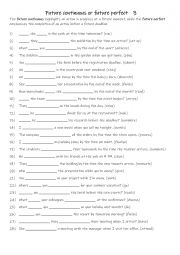
|
A2+-B1 Future continuous or future perfect 3
First, students need to familiarise themselves with the 2 tenses and their use. Then they read the sentences to work out which tense is needed to complete the gap-fill using the infinitive in (). Each tense is used 12 times! Answers on page 2
Level: intermediate
Age: 9-100
Type:
Downloads: 121
|
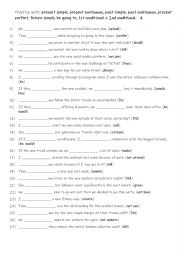
|
B1-B2 Practise with present simple, present continuous, past simple, past continuous, present perfect, future simple, be going to, 1st conditional & 2nd conditional. 4
First, students need to familiarise themselves with the tenses & conditionals, checking their meaning and use. Then they read the sentences to see which one is needed to complete the sentence using the given verb in (). Each tense is used 3 times! Answers on page 2.
Level: intermediate
Age: 10-100
Type:
Downloads: 121
|
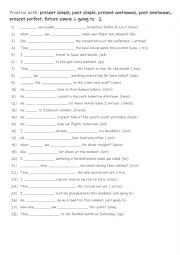
|
A2-B1 Practise with present simple, past simple, present continuous, past continuous, present perfect, future simple & going to 2
First, students need to familiarise themselves with the tenses and use. Then they read the sentences to work out which one is needed to complete the gap-fill using the infinitive in (). Each tense is used 3 times! Answers on page 2
Level: elementary
Age: 9-100
Type:
Downloads: 121
|
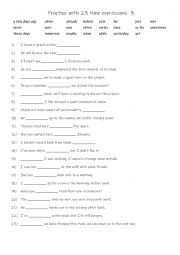
|
Practise with 23 adverbs of time 3
Recognising these expressions improves listening and reading comprehension, enabling students to grasp stories, instructions, and conversations more effectively. First, students need to familiarise themselves with the 23 time expressions and their use. Then they read the sentences to work out which one is needed to complete the gap-fill. Answers on...
Level: elementary
Age: 10-100
Type:
Downloads: 121
|
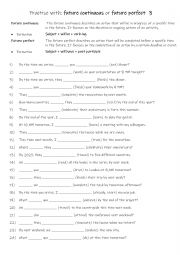
|
A2+-B1 Practise with future continuous or future perfect 3
Understanding these tenses allows students to communicate future goals, schedules, and timelines effectively, enhancing both their speaking and writing skills for academic, professional, and everyday use. First, students need to familiarise themselves with the 2 tenses and their use. Then they read the sentences to work out which tense is needed t...
Level: intermediate
Age: 9-100
Type:
Downloads: 121
|
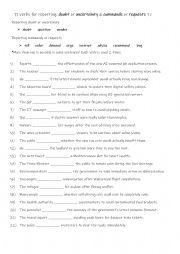
|
11 verbs for reporting doubt or uncertainty & commands or requests 1c
First, students need to familiarise themselves with the 11 verbs and check their meaning and use. Then they read the sentences to see which verb is needed to complete the sentence. Each verb is used 2 times! Answers on page 2
Level: elementary
Age: 9-100
Type:
Downloads: 121
|
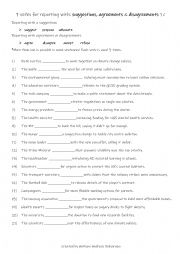
|
7 verbs for reporting with suggestions, agreements & disagreements 1 c
First, students need to familiarise themselves with the verbs and check their meaning and use. Then they read the sentences to see which verb is needed to complete the sentence. Each verb is used 3 times! Answers on page 2.
Level: elementary
Age: 9-100
Type:
Downloads: 121
|
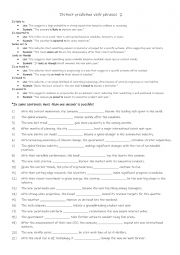
|
B1-B2 7 Distinct prediction verb phrases 2
These phrases help express different levels of certainty about future events. "Is likely to" suggests something will probably happen based on evidence, while "is expected to" refers to something predicted or planned. "Seems set to" indicates something is prepared to happen soon, and "looks as though" is used when something seems probable based on c...
Level: intermediate
Age: 10-100
Type:
Downloads: 121
|
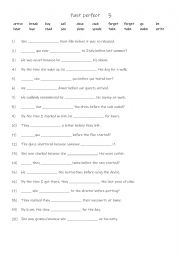
|
Past perfect 3
First, students need to familiarise themselves with the 20 verbs. Then they read the sentences to see which verb is needed to complete the sentence. Each verb is used 1 time! Answers on page
Level: elementary
Age: 10-100
Type:
Downloads: 121
|
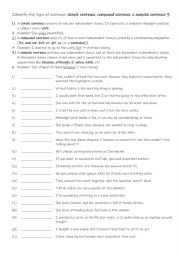
|
A2 Identify the type of sentence simple sentence, compound sentence & complex sentence 3
Students should learn to identify simple, compound, and complex sentences because it helps them write with more variety, organise ideas clearly, understand reading texts more easily, prepare for future learning, and communicate their thoughts more accurately. Each type is used 7 times. Answers on page 2.
Level: elementary
Age: 9-100
Type:
Downloads: 121
|
|
|
|
|












